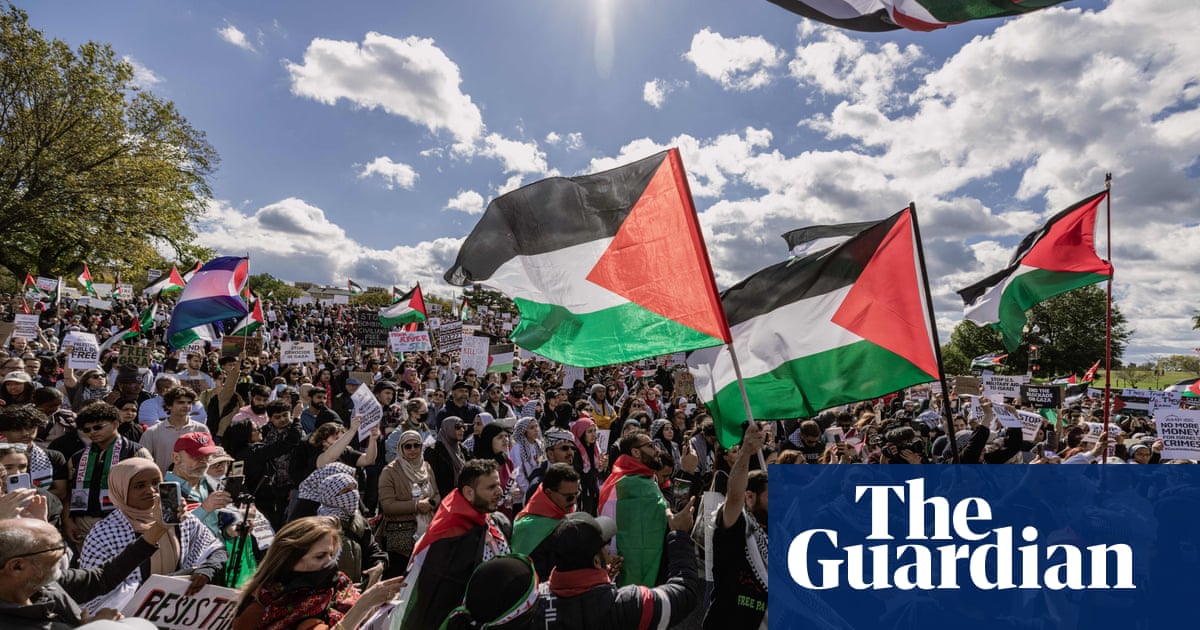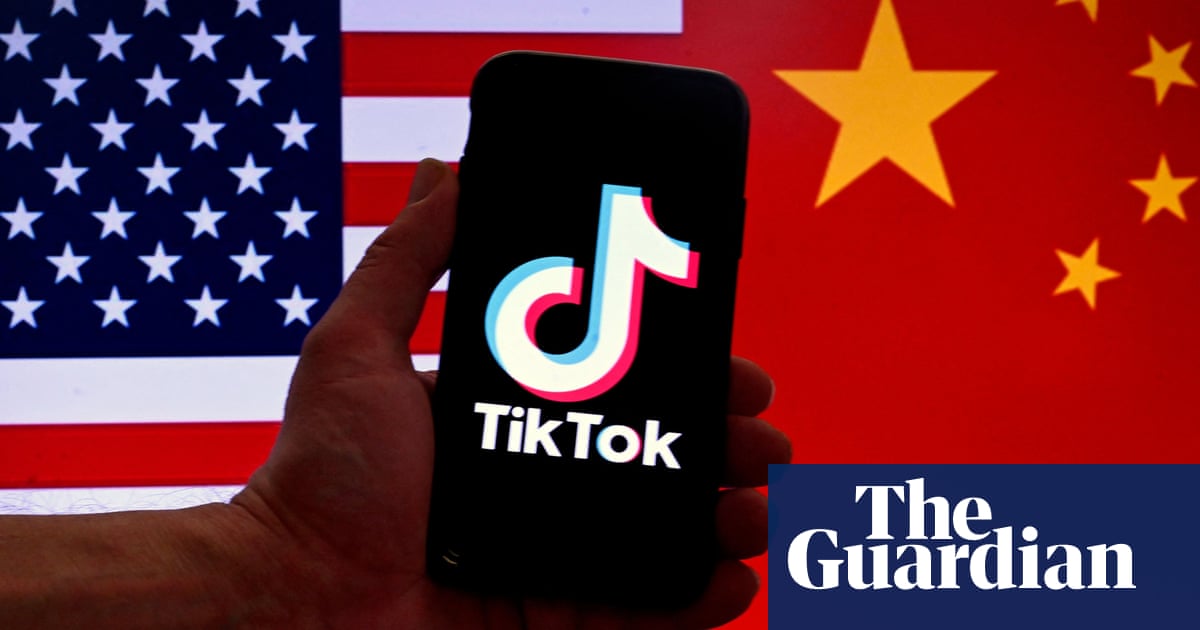
The open letter, published in Artforum on 19 October, declared: “We support Palestinian liberation and call for an end to the killing and harming of all civilians.” It was signed by thousands of artists, scholars and cultural workers, including the art world magazine’s editor, David Velasco.
A week later, Velasco was fired from the publication he had worked at for 18 years, reportedly after pushback from Martin Eisenberg, a major arts patron and Bed Bath & Beyond heir. In a post on Artforum that evening, the magazine’s publishers said that the pro-Palestine letter, which initially did not mention Hamas’s attack that killed 1,400 Israelis, was “not consistent with Artforum’s editorial process”. At least four Artforum editors have resigned in protest against Velasco’s firing.
While sympathy for Palestine has long been a minority position in the United States, supporters are being punished for speaking out at a disturbing new level as Israel pummels Gaza, killing thousands of Palestinians in the weeks following the 7 October Hamas terror attacks.
Some, like Velasco, have lost their jobs. A Philadelphia sports writer was fired after tweeting “solidarity with Palestine” in criticism of a 76ers post that offered support to Israel after Hamas’s initial attack. In another high-profile incident, a University of California, Berkeley, professor was sacked as editor-in-chief of the scientific journal eLife after he retweeted an Onion article that, he said, “calls out indifference to the lives of Palestinian civilians”.
A spokesperson for Palestine Legal, a civil rights group, says it has responded to more than 260 “incidents of suppression” against Palestinian rights activists over two weeks of October – more than it did in all of last year. The Council on American-Islamic Relations (Cair), a civil rights non-profit, says it received 774 complaints between 7 October and 24 October – the largest wave of complaints it’s handled since Donald Trump announced his “Muslim ban” in 2015. This wave has targeted professional activists as well as ordinary people who have spoken in defense of Palestinians. It has reportedly escalated into death threats, assaults and visits from the FBI to Muslim individuals and mosques.
In the United States, the highest levels of power have long supported voices backing Israel and its military. Now, supporters of Palestine fear the war presents an opportunity for supporters of Israel’s government to further crush dissent in the US. “We know that Israel-aligned organizations are going to push to have their full wishlists granted,” says Diala Shamas, a staff attorney at the non-profit Center for Constitutional Rights (CCR), which supports pro-Palestinian activists. She says Palestinian rights attorneys “know the playbook” and are bracing for the onslaught.
‘Tarring Palestinian rights speech’
The swift blowback against pro-Palestinian voices builds on decades of organized efforts to “tar Palestinian rights speech as pro-terrorist or antisemitic”, says Justin Sadowsky, an attorney at Cair. The late civil rights attorney Michael Ratner called this the “Palestine exception to free speech”.
In 2015, CCR and Palestine Legal published a report on the tactics used by pro-Israel lobbying groups, school administrators and public officials to shut down Palestinian rights activists. They included false accusations of antisemitism or support for terrorism, legal threats and criminal investigations, and they often succeeded in “intimidating or deterring Palestinian solidarity activists from speaking out”, the report found.
The Jewish National Fund’s 2019 lawsuit against the US Campaign for Palestinian Rights, which accused the human rights group of supporting terrorism and acting as a front for Hamas, was a recent example, the CCR’s Shamas says. While an appeals court tossed the suit in May, Shamas, who defended against the lawsuit, called cases like these “a form of silencing”. (The Jewish National Fund did not respond to a request for comment.)
Hina Shamsi, an attorney with the American Civil Liberties Union (ACLU), says: “The McCarthyite atmosphere against supporters of Palestinian rights had been getting worse,” and the current conflict is only escalating these concerns.
Last week, the Florida governor, Ron DeSantis, ordered public universities to disband campus groups associated with the Students for Justice in Palestine (SJP) organization, accusing it of violating a law against providing “material support” to terrorism. Sadowsky says Florida’s allegations are spurious – “They just claimed sophomorically that because some people at SJP have said some things that they construe as supportive of Hamas, that they support terrorism” – and almost certainly violate the first amendment. (SJP did not respond to a request for comment.)
In parallel with Islamophobic attacks and suppression of Palestinian rights activities in recent weeks, chilling reports of antisemitic incidents have also increased.
The Anti-Defamation League (ADL), an anti-hate organization dedicated to fighting antisemitism and extremism, recorded 312 antisemitic incidents in the US in the two weeks following 7 October, a nearly fourfold increase compared with the same period last year. Over the weekend, the FBI was notified of antisemitic threats made against Jewish students at Cornell University, prompting the Biden administration to step in and condemn antisemitism on campuses. In New York, attendees at pro-Palestinian rally reportedly stomped an Israeli flag and flashed an image of a swastika, and a woman told police she was punched in the face by a man who said it was because she was Jewish.
“At this moment when antisemitism is surging around the world, ADL has an obligation to speak out strongly when pro-Palestinian organizations, leaders and student groups defend or celebrate the bloodthirsty actions of a known terrorist group,” said an ADL spokesperson in a statement.
While Sadowsky, who is Jewish, characterizes some of ADL’s actions as part of a pattern of deliberate intimidation to make it “very difficult for Palestinians to talk in a forthright way about what’s going on”, many Jewish people feel protected by them. An expression like “from the river to the sea”, chanted at some pro-Palestinian demonstrations, is a microcosm of these high sensitivities. For some, it’s seen as a demand for the eradication of Israel altogether and the displacement of millions of Jews. The British home secretary has suggested police should clamp down it, calling the chant an “expression of a violent desire”, and the ADL spokesperson described it as “a call to destroy Israel”. However, Sadowsky says the ADL is “dangerously misleading people into believing that peaceful protests are something nefarious”, since many demonstrators see the chant as a non-violent, democratic call for human rights.
‘Constricting the space for debate’
Today, there are more Americans willing to openly challenge US foreign policy – and that includes speaking up for Palestine. A March 2023 Gallup poll found that the number of Americans who said they were more sympathetic toward Palestinians than Israelis roughly doubled over the last decade, to 31% of respondents.
The prominent Palestinian American scholar Rashid Khalidi recalls feeling overwhelmingly outnumbered at Columbia University in 2003 when pro-Israel advocates protested against him and other faculty and students who spoke out against Israel amid intense fighting in Gaza and the West Bank. News crews hounded him on campus, and pro-Israel students made a documentary about the controversy. “I think the narrative was pretty firmly in the hands of people who supported Israel,” he says. But, he continues, “there’s a generational change taking place, with young people having an entirely different set of views. They consume different media. I think they’re more educated, more worldly, and better informed than their elders.”
The old guard is pushing back. In addition to the firings and calls for investigations into SJP, two law firms rescinded job offers to students for statements blaming Israel alone for the 7 October attacks. One of the firms, Davis Polk, is reconsidering its decision for two of three students, who said they hadn’t approved the letters. Billionaire donors have threatened to pull donations to top universities if the institutions don’t condemn Hamas and crack down on criticism of Israel on campus. Meanwhile, circling “doxxing trucks” sponsored by rightwing activists display the faces and personal details of pro-Palestine students at Harvard and Columbia, calling them “antisemites”.
Incidents like these create a “culture of suspicion and guilt by association”, says Brian Hauss, senior staff attorney with the ACLU. “I think that’s going to dramatically constrict the space available for political debate.”
Beyond campuses, pro-Israel lawyers are gearing up for battle. Last week, Shurat HaDin – a pro-Israel legal organization which describes itself as “bankrupting terrorism one lawsuit at a time” – announced it was launching a “legal war room” and put out a call for hundreds of attorneys across the world to join in support of Israel’s war efforts. CCR’s Shamas says that is likely to lead to redoubled efforts to pass anti-boycott legislation, redefine the international working definition of antisemitism to include opposition to Zionism, and expand the definition of “material support of terrorism” to target more Palestinian human rights speech.
Generally, lawsuits against pro-Palestine activists are a way to “distract and deviate our resources” from efforts to “draw attention to genocide that’s happening in Gaza”, Shamas says. Hauss says laws against the boycotting of Israel in particular, which 36 states have enacted, “directly stifle political advocacy, by making people choose between their livelihoods and their first amendment rights”. On Monday, the Jewish American scholar Nathan Thrall announced that he had been disinvited from speaking at the University of Arkansas for refusing to sign an anti-boycott pledge required of public contractors by state law.
For now, pro-Palestinian lawyers say they’re standing by, ready to defend pro-Palestinian speech, and that people should understand their basic protections.
The constitution’s first amendment means the government can’t punish someone for speech it doesn’t like. Public sector employees usually can’t be fired, or public school students punished, for speaking out or holding protests. California extends these free speech protections to private universities.
Though there are fewer protections in the private sector, federal law protects all employees and job applicants from being discriminated against based on their race, color, religion, sex or national origin. That means it’s possible that a person from the Middle East or a Muslim person who lost a job for speaking about Palestine could claim discrimination, Sadowksy says, though employers could also challenge the claims. Certain states, like New York and California, also offer some protections for employees’ political activity.
“If someone is harassing you, or if someone’s trying to discipline you, contact us,” says Sadowksy.
‘Go hunt Palestinians’
The campaign to suppress pro-Palestinian speech is likely to worsen, and in some cases has already taken on a frightening new tenor.
On 14 October, a six-year-old Palestinian American boy was killed when he and his mother were allegedly stabbed by their landlord, who was angry about the conflict in the Middle East, prosecutors say. Within that same week, a Palestinian American family in Colorado says their home was shot at, an Illinois man was charged after threatening to shoot two Muslim men in a parking lot, and a Michigan man was arrested after putting out a call on Facebook to “go and hunt Palestinians”, according to police. Last week, someone reportedly drove through a pro-Palestinian protest in Minneapolis, and in Eugene, Oregon, a man was arrested after firing a splatter ball gun at pro-Palestine protesters.
There’s also uncertainty over what role US authorities will play. Civil rights groups say they have responded to recent incidents in which pro-Palestine activists and mosques received visits from FBI agents, bringing to mind the surveillance of Muslims in the wake of the 9/11 attacks. While there are “palpable fears of a repeat of post-9/11 level abuses in the United States, we haven’t seen those kinds of systemic rights violations at this point”, says Shamsi. “I think that’s largely due to years of pushback, advocacy, and litigation by impacted communities themselves, along with allies.”
Those civil rights groups now worry about their own safety. Cair canceled its annual fundraiser at a Virginia Marriott after callers “threatened to plant bombs in the hotel’s parking garage, kill specific hotel staff in their homes, and storm the hotel in a repeat of the January 6 attack on the US Capitol if the events moved forward”, per a statement. Two days earlier, a Houston Hilton canceled a scheduled conference for the US Campaign for Palestinian Rights, the group sued by the Jewish National Fund, citing “escalating security concerns”.
“It’s unclear whether people who support Palestinians’ right to exist will be able to congregate on someone else’s property in the foreseeable future without a torrential wave of death threats,” Sadowsky says.












